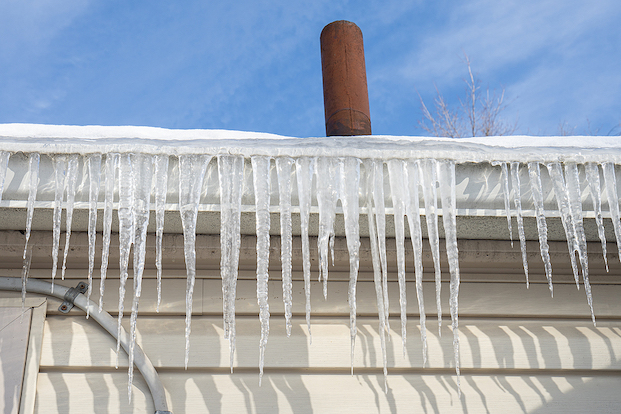Protect Your Home from Water and Ice Damage
December 14, 2022
Water and ice damage affects homeowners everywhere, but you can protect your home with the following tips.
Water damage can cause serious problems, ranging from mold and mildew to structural weakness. Between 2015 and 2019, 1 in 50 insured homes filed a water damage claim with their insurance. While it’s important to have homeowners insurance to protect your property from water damage, you can avoid these problems by taking care of your property.
Clean and Protect Your Gutters
Your home’s gutters protect your house from water damage by directing water away from your roof and foundation. Clogged gutters overflow during rainstorms and allow water to pool around the eaves and foundation, which can cause problems like soil heaving, foundation cracking, ice dams, and roof leaks.
Clean your gutters at least once annually to prevent your gutters from clogging. You may need to clean your gutters multiple times per year if your property has a lot of trees.
If your gutters need more than twice the annual cleaning, gutter guards can protect your gutters and prevent them from clogging. Trim nearby trees to remove overhanging branches that will drop leaves, sticks, and needles into the gutters.
Insulate
In 2021, many residents of Texas experienced a winter storm that froze pipes and caused ice dams. This storm was a perfect example of what happens when power outages and extremely cold temperatures co-occur. A survey of affected Texans showed that approximately 15% of impacted homeowners had frozen pipes, and countless others saw ice dams form on their roofs.
What’s an ice dam? An ice dam happens when “hot spots” on the roof cause snow to melt. The melting snow rolls down the roof to the colder eaves, where it refreezes. Eventually, the ice backs up under the shingles and into the attic itself.
How can you protect yourself? Insulation can protect your home’s pipes from cold temperatures in winter. Attic insulation also promotes even heating of the roof, which can prevent an ice dam (and thus a roof leak) from forming.
Insulate the pipes in your home with pipe insulation. Pipe insulation wraps around the pipes and protects them from below-freezing temperatures. You can find pipe insulation at hardware stores and home improvement centers. Simply cut down the insulation to the length of the pipe, remove the adhesive backing, then attach the insulation.
Insulate your attic if it’s needed. You’ll know your attic needs more insulation if you can see the floor joists. As a general rule, insulation should cover the joists so they can no longer be seen. For best results, hire a professional to install attic insulation.
Regulate Your Home’s Temperature
Never turn off your thermostat in winter, even if you’re leaving town. If you’re planning to be out of the house for a few days, turn down your home’s furnace to 55 degrees. This allows you to save money on heating costs while preventing your pipes from freezing.
Some additional tips:
- Program your home’s thermostat to maintain a temperature at or above 55 degrees
- Service your home’s heating system in the fall or early winter to avoid a furnace breakdown
- Leave a trickle of water running when temperatures outside are expected to drop below freezing
Seal Cracks
Tiny cracks in your home’s siding or foundation can become a hiding place for water, which can freeze during times of severe weather, causing cracks to widen and make way for water leaks. Seal all cracks in your home’s exterior before winter comes.
Update Your Homeowner’s Policy
Water and ice damage can lead to hundreds or thousands of dollars in repairs. Is your house protected? Contact your insurance agent to evaluate your coverage.
